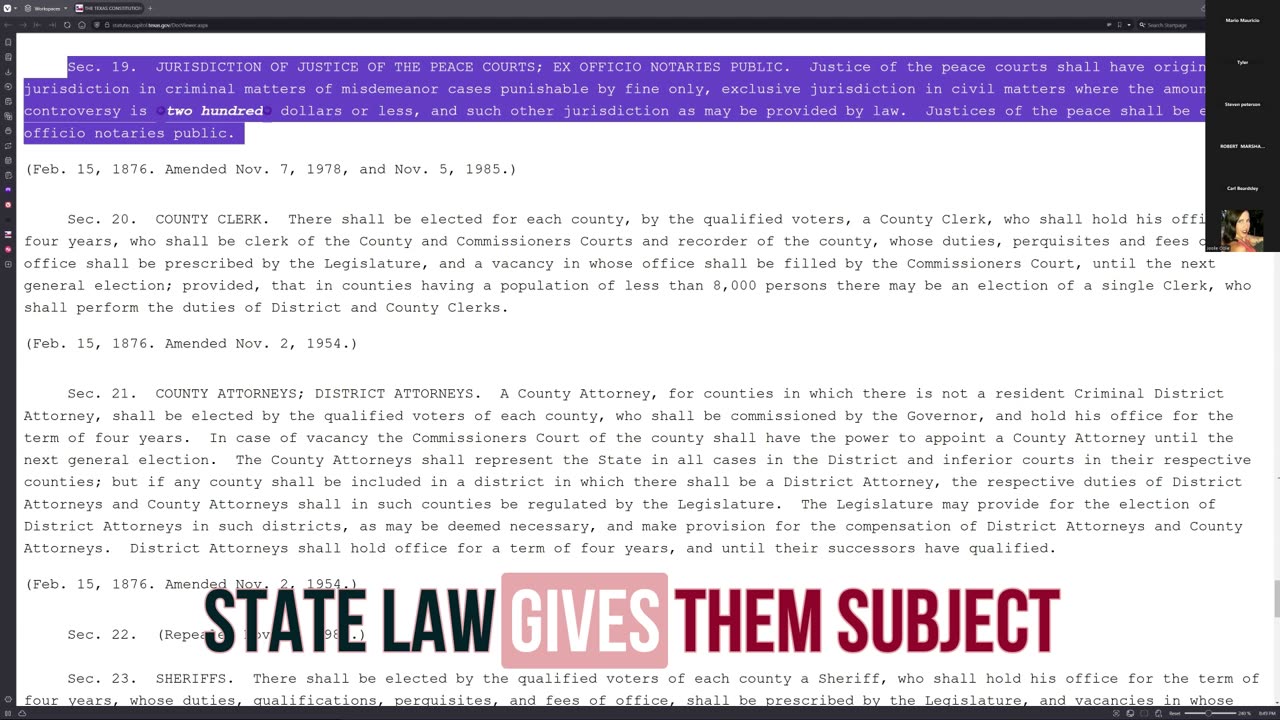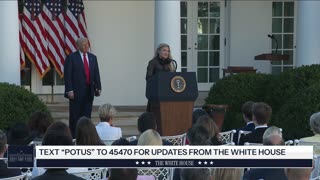Premium Only Content

2-6-25 TAO of Law: analyzing Randy's Lawsuit
Lecture analyzing legal procedures, jurisdiction, and challenges in court cases, emphasizing understanding laws and administrative codes for effective defense.
1. Randy's Lawsuit and Legal Arguments
• Randy's lawsuit focuses on claims against judges for failing to perform administrative duties, specifically issuing warrants when criminal complaints are filed by private citizens.
• The lawsuit cites various legal provisions, including Texas Code of Criminal Procedure 15.09, Texas Penal Code 38.05 (hindering apprehension or prosecution), and Texas Penal Code 39.03 (official oppression).
• Eddie critiques Randy's approach, pointing out errors in legal citations, such as misinterpreting Texas Penal Code 39.03 as prescribing duties when it is strictly punitive.
• Eddie emphasizes the importance of understanding legal language and proper structuring of lawsuits, highlighting Randy's failure to present valid claims or arguments.
• The discussion includes the ambiguity of terms like "state" in legal contexts, with Eddie explaining how definitions in Texas Government Code Chapter 311 create confusion.
2. Fiduciary Duty and Judicial Ethics
• Fiduciary duty is described as the highest duty recognized by law, requiring loyalty, good faith, and accountability from public officials.
• Judges are expected to uphold impartiality, fairness, transparency, and avoid impropriety, as outlined in Texas Canons of Judicial Conduct (Canon 2A and Canon 1).
• Eddie discusses the breach of fiduciary duty, citing case law such as First United Pentecostal Church of Beaumont v. Parker and Crim Truck Tractor Company v. Navistar International.
• Randy's lawsuit attempts to argue that judges violated fiduciary duty by failing to issue warrants, but Eddie critiques the lack of supporting case law and proper legal reasoning.
3. Procedural and Substantive Due Process
• Eddie explains the difference between substantive due process (rights inherent in case law and the Bill of Rights) and procedural due process (codified procedures that must be followed).
• Substantive due process includes rights like the right to remain silent, while procedural due process involves adherence to established legal procedures.
• Eddie emphasizes the importance of understanding and leveraging procedural violations in court cases, noting that failure to follow procedures can interfere with substantive rights.
4. Administrative Code and Legal Research
• Eddie guides a participant from Minnesota on how to start legal research, explaining the structure of Minnesota's statutes and administrative code.
• He advises searching for criminal procedure chapters (625-634) and contacting the Minnesota Reviser’s Office for access to the administrative code.
• Eddie highlights the importance of understanding state agencies' rules and their authority, particularly for agencies like the Department of Motor Vehicles and state police.
5. Appeal Bond and Jurisdiction Challenges
• Eddie discusses the implications of failing to file an appeal bond correctly, noting that invalid paperwork or missed deadlines can result in default judgments.
• He explains that once a fine is paid, the case is considered settled, and appeals are time-barred, but challenges to jurisdiction can still be raised at any time.
• Eddie critiques a participant's father's decision to sign an appeal bond with "signed" instead of a proper legal signature, leading to its rejection.
6. Justice of Peace Court Jurisdiction
• Eddie clarifies the jurisdiction of Justice of Peace Courts in Texas, stating that the Texas Constitution limits civil cases to $200, despite statutes claiming $20,000.
• He explains the conflict between statutory law and constitutional provisions, emphasizing the need to challenge jurisdiction when discrepancies arise.
7. Historical Context of Postal Roads and Enumerated Powers
• Eddie addresses a participant's theory about Benjamin Franklin's role as Postmaster General, explaining that postal roads were included in enumerated powers to ensure communication between colonies.
• He dismisses the idea that Franklin's role was intended as an advisory position, emphasizing the practical need for a federal mail system during the nation's expansion.
8. General Advice on Legal Strategy
• Eddie advises participants to thoroughly understand the law, avoid patro-nut arguments, and focus on valid legal reasoning to win cases.
• He stresses the importance of knowing legal procedures, researching statutes, and using precise language in legal documents.
• Eddie critiques participants for relying on flawed strategies and emphasizes the need for motivation and intelligence to effectively navigate legal systems.
-
 LIVE
LIVE
GritsGG
27 minutes agoSolos! Most Wins in WORLD! 3734+!
39 watching -
 3:59:54
3:59:54
Right Side Broadcasting Network
6 hours agoLIVE REPLAY: President Trump Participates in the Charlie Kirk Medal of Freedom Ceremony - 10/14/25
117K33 -
 1:05:00
1:05:00
Dr. Drew
5 hours agoLetitia James Just Found Out "No One Is Above The Law" In Spectacular Display Of FAFO w/ Viva Frei – Ask Dr. Drew
43.1K14 -
 1:12:42
1:12:42
The White House
3 hours agoPresident Trump Participates in a Medal of Freedom Ceremony for Charlie Kirk
27.7K11 -
 1:42:10
1:42:10
Professor Nez
6 hours ago🚨🇺🇸Trump Awards Medal of Freedom to Charlie Kirk LIVE: President Trump Honors Charlie Kirk
29.6K12 -
 LIVE
LIVE
LFA TV
21 hours agoLIVE & BREAKING NEWS! | TUESDAY 10/14/25
947 watching -
 1:12:06
1:12:06
vivafrei
5 hours agoAre they Killing the Ostriches? Roger Ver Strikes a Deal! Tommy Robinson, Tom Homan & MORE!
124K41 -
 34:01
34:01
Stephen Gardner
21 hours ago🔥You won’t BELIEVE what just happened to Trump!
36.1K30 -
 1:36:51
1:36:51
The Quartering
5 hours agoThe End Of Trans Madness, Alex Jones Loses Final Plea, Rock Bottom For Star Trek & More
118K37 -
 36:53
36:53
Stephen Gardner
4 hours ago🔥LEAKED! Trump's Secret ANTIFA Takedown Plan EXPOSED!!
32.1K25